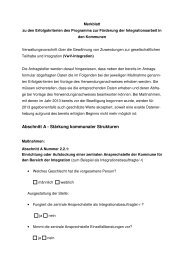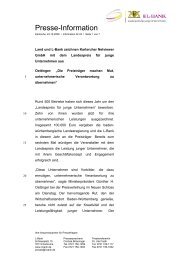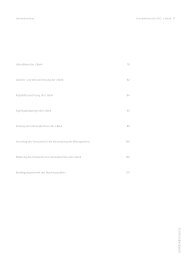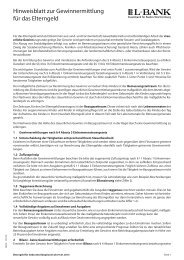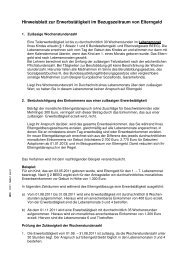Landeskreditbank Baden-Württemberg - L-Bank
Landeskreditbank Baden-Württemberg - L-Bank
Landeskreditbank Baden-Württemberg - L-Bank
You also want an ePaper? Increase the reach of your titles
YUMPU automatically turns print PDFs into web optimized ePapers that Google loves.
REGULATION AND SUPERVISION OF L-BANK<br />
IN THE FEDERAL REPUBLIC OF GERMANY<br />
Introduction to the German <strong>Bank</strong>ing System<br />
The German banking system comprises a variety of public sector and private sector banks of two general<br />
types: universal banks and specialized banks. We are a specialized state development bank (Förderbank) that is<br />
subject to the same regulation, in particular the German <strong>Bank</strong>ing Act (Kreditwesengesetz – KWG), as all other<br />
German banks.<br />
The German <strong>Bank</strong>ing Act and Regulation by the Federal Supervisory Authority for Financial Services<br />
On May 1, 2002, the three former separate supervisory authorities for the financial sector, — the Federal<br />
<strong>Bank</strong>ing Supervisory Office (Bundesaufsichtsamt für das Kreditwesen), the Federal Securities Supervisory<br />
Office (Bundesaufsichtsamt für den Wertpapierhandel) and the Federal Insurance Supervisory Office<br />
(Bundesaufsichtsamt für das Versicherungswesen) — were combined into a single comprehensive financial<br />
services supervisory authority, the Federal Supervisory Authority for Financial Services (Bundesanstalt für<br />
Finanzdienstleistungsaufsicht, the “BaFin”). The BaFin supervises banks, insurance companies and financial<br />
services institutions.<br />
All banks in Germany, including us, are subject to comprehensive governmental supervision and regulation<br />
on a consolidated basis by the BaFin in accordance with the German <strong>Bank</strong>ing Act. The BaFin is authorized to<br />
issue regulations and guidelines implementing the provisions of the German <strong>Bank</strong>ing Act and other laws<br />
affecting German banks. Its main purpose is to protect the soundness of the German banking system. The<br />
German <strong>Bank</strong>ing Act and the regulations issued thereunder have been amended over time in order to keep them<br />
in line with internationally accepted principles. In doing so, Germany has implemented the recommendations on<br />
banking supervision issued by the Basle Committee on <strong>Bank</strong>ing Supervision (the “Basle Committee”) at the<br />
<strong>Bank</strong> for International Settlements and transformed the relevant European Council Directives into German law.<br />
In April 2003, the Basle Committee on <strong>Bank</strong>ing Supervision issued its third Consultative Paper for a New<br />
Basle Capital Accord (“Basle II”) that will replace the current Basle Capital Standards. On June 25, 2004, the<br />
Basle Committee on <strong>Bank</strong>ing Supervision approved, and one day later the central bank governors and the heads<br />
of bank supervisory authorities in the Group of Ten (G10) countries endorsed, the publication of the<br />
International Convergence of Capital Measurement and Capital Standards: a Revised Framework. The goal of<br />
the Basle Committee is that implementation by the member states shall take place by year-end 2006. Basle II<br />
focuses on three key elements, or pillars: (i) minimum capital requirements, which enhance the measurement<br />
framework of Basle I, the first pillar; (ii) supervisory review of bank’s capital adequacy, the second pillar; and<br />
(iii) market discipline through effective public disclosure to provide for sound banking practices, the third pillar.<br />
In addition to this capital regulation, Basle II has the goal to increase substantially the risk sensitivity of the<br />
minimum capital requirements by closely aligning banks’ capital requirements with prevailing modern risk<br />
management practices.<br />
Under the German <strong>Bank</strong>ing Act, all German banking and financial services institutions are required to have<br />
a license from the BaFin to carry on business. The BaFin supervises the operations of all banks, including us, to<br />
ensure that they conduct their business in accordance with the provisions of the German <strong>Bank</strong>ing Act and other<br />
applicable German laws and regulations. Particular emphasis is placed on compliance with capital adequacy and<br />
liquidity requirements, lending limits and prudential standards governing lending imposed by the German<br />
<strong>Bank</strong>ing Act and the regulations promulgated thereunder.<br />
Cooperation by the BaFin and the Bundesbank<br />
The BaFin carries out its banking supervisory role in cooperation with the Federal Central <strong>Bank</strong> (Deutsche<br />
Bundesbank, the “Bundesbank”), as required under the German <strong>Bank</strong>ing Act. The BaFin has the sole authority to<br />
36



